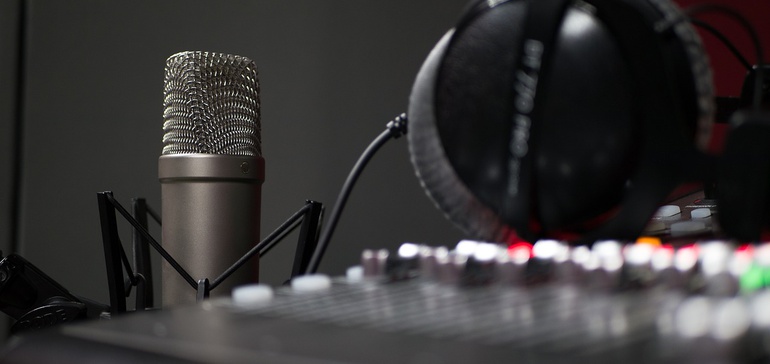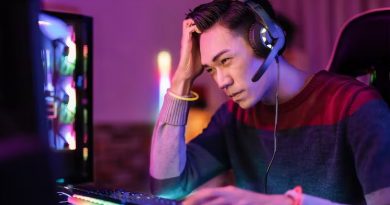3 ways podcasting can strengthen core academic skills
From helping students find a voice to improving their writing skills, the popular audio format can be a powerful curricular supplement.
Most striking about the podcast “Rice & Shine” is not only the topics covered weekly — from sexism to Asian American hate crimes — but the fact the morning show is created and recorded by four 10th-graders on Mercer Island in Washington.
Launched as a vehicle to share their thoughts on movies or how the four friends met, the audio show now has thousands of downloads and can serve as a blueprint for what student-run podcasts can deliver.
With support from Mercer Island High School broadcast media teacher Joe Bryant, the high schoolers feel they can talk about any subjects they want — as long as they follow the law and school rules, said Lauren Suzuki, one of the four students.
That includes the freedom “to talk about the harder things,” Suzuki said. “It’s about getting your voice on the air and saying what you want to say.”
As they grow, students find their voice, discover interests that spark a fire and develop the confidence to share their thoughts with a wider world. Log on to YouTube or TikTok and you can hear many of them. But educators are also channeling their students toward podcasts as another way to tell stories.
Through podcasts, students can develop skills from in-depth research and narrative building to technical know-how and project planning, experts suggest. And while these skills can help students in their academic pursuits, they can continue to serve learners when they graduate, grow up and enter the working world.
Finding their voice
Take “Rice & Shine,” a podcast so named at first as a pun. But it stuck, said Sophie Hill, who hosts the show along with Suzuki, Grace Go and Ava Yeh. And she could not be more proud.
“We wanted [the podcast] to be a morning show and a cultural show,” she said. “And rice is a big part of that. Rice is universal.”
So too are the topics covered in the audio show, which has found a wider audience by covering topics as varied as eating disorders, growing up as Asian American teenagers and even mental health.
“As high-schoolers, we want to talk about things that are relevant to us,” said co-host Go. “But because we had a platform, we felt we had a responsibility to talk about those heavier topics.”
The pieces are shared with schoolmates and also posted on podcasting sites Transistor and Audible. They’ve been heard worldwide, say the team, from the U.S. to Taiwan to Germany to Bolivia. And through the process of creating the podcast and attaining the reach they’ve achieved, the four have uncovered agency in the knowledge they have a voice and can make a difference in helping others see the world a little differently, too.
“I think for me, radio has helped me come out of my shell, even in class discussions,” said Yeh. “It’s opened up a new outlet for me by sharing and voicing our opinion.”
Podcasting has also helped Connie Michael’s 5th-grade students at Crow Agency Public School in Hardin, Montana, develop more confidence in themselves.
Students come up with topics, write scripts and then record the pieces, which have included coverage of safety needs for students their age as well as their feelings about keeping alive their native Crow culture and language. Posted on SoundCloud, the show has also earned recognition including an honorable mention in NPR’s Student Podcast Challenge in 2020.
“The kids felt heard and seen as more than just kids who live on the reservation,” Michael said. “It also gave them a sense of pride and confidence.”
Hearing back from listeners can have a powerful effect, too, as the hosts of “Rice & Shine” found when one teen reached out after a show, said Hill.
“I remember clearly, we had someone who felt they could trust us,” Hill said. “It helped us feel we could make a bigger difference. Numbers don’t really mean that much to me. It’s about the actual people.”
Developing professional skills
In New York, Jon Forstein hopes students walk away from his podcasting course knowing how to plan an audio piece and having the technical skills to make that happen.
“It’s really about how to plan and produce something, from pre-production to recording to editing, recording and sharing it with the world,” said Forstein. “Preparing for a podcast helps them crystalize their thinking.”
Forstein launched the course, now in its first year, at the School for Cooperative Technical Education and Judith S. Kaye High School. Students — even those who have recently graduated — can apply for the free classes where their projects can vary in style from a straight interview to a diary format.
Students begin by creating a plan that covers the topics they want to hit during their recording, along with times and cues. They also learn how to use microphones, headphones and computer software, receiving training that might help them become sound engineers or videos editors one day.
The program has already been successful enough to get more applicants than it can accept.
“We’re excited about the impact and the exposure to a whole world of tools and careers that these kids might not have had,” Forstein said.
How to build a narrative
David Green has kept a podcasting program in his curriculum for over 15 years because of the way it combines multiple skills in one swoop — from technical know-how to writing.
“I would say the fact that you can blend so many subjects is why I love it so much,” said the 3rd-grade classroom co-teacher at North Shore Country Day School in Winnetka, Illinois. “It’s interdisciplinary.”
His students, while young, are pretty hands-on with the podcasting equipment, doing much of the recording while Green handles the bulk of the editing on the GarageBand or Hindenburg programs. Many of the stories come from the children, such as a piece about getting stung by a bee. A favorite podcast of Green’s was one where students imagined themselves in the company of Martin Luther King Jr., with questions they would have liked to ask.
Green spends a lot of time teaching students the craft of building an audio story. They learn the value of research and prep work, the importance of good writing, and also the impact of sound effects and background music on punching up a good show for the listener.
“I would go to these audio conferences and listen to advice on building radio stories,” Green said. “And what I heard matched the same writing curriculum I used with my 8- and 9-year-olds: ‘How do you create a good personal narrative?'”
Brad Becker also approaches podcasting lessons as a writing exercise for the middle and high school students who take his course at Sayre School in Lexington, Kentucky. The lessons apply to any story, whether it’s a piece about making money through baseball card collecting or about volleyball being a contact sport.
“I make sure they understand a good radio program is based on a script,” Becker said. “They start to learn why you choose certain words for podcasts because they’re easier to understand, and also understand speech patterns.”
Finished stories that have resonated with Becker include one that three students recorded about being adopted and another about a town that made musical instruments from elements pulled from a landfill. And, of course, there’s the piece about the school’s maintenance staff — the middle school winner for NPR’s Student Podcast Challenge in 2021.
Becker hopes all his students walk away as better writers — and that some decide to continue with the craft when they leave his class, too.
“I tell them to imagine that this was the first episode of an ongoing series,” he said. “I tell them I hope they will dive in and do their second, third or fourth episode this summer.”
Source: https://www.k12dive.com/news/3-ways-podcasting-can-strengthen-core-academic-skills/620705/




